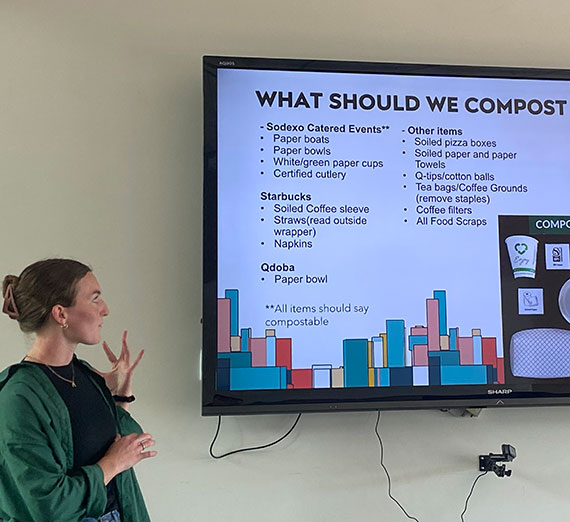Trash, Recycle or Compost: What To Do With Your Waste

Two billion tons of municipal solid waste, everyday items that are used and then discarded, is accumulated each year. This staggering reality contributes to an ongoing overconsumption issue called the global waste crisis.
Gonzaga University is attempting to tackle its part in this crisis by simultaneously educating its students and implementing ways to aid in going green. The Office of Sustainability recently had its Waste Reduction Educator Tristy Osbon host a waste workshop to teach Gonzaga students about the global crisis and how Gonzaga is helping combat it. These sessions aim to gather students and facilitate knowledge of proper disposal in one's personal life and on campus.
A pillar of Gonzaga’s mission is to care for the planet, which is evident through the work to appropriately discard waste, performed by organizations across campus including the Office of Sustainability. Gonzaga administered “three stream” waste bins – accepting trash, recycle, and compost throughout the university, featuring visual guides of where individuals should correctly dispose of their trash. Additionally, GU purchased 500 compost bins in the spring of 2021 for on-campus housing residents to sustainably throw away their food. Efforts to properly discard waste do not go unmonitored – a GU Waste report is updated for students to track how green their school is. The university has also adopted waste sites such as battery drop-offs and waste compactors, an alternative that reduces biomass, collection costs, and maintenance fees.
Osbon disseminated proper disposal facts to the workshop attendees which outlined acceptable and non-acceptable disposal methods in a Zag’s daily campus life. Her main guidelines to follow include:
What to Throw Away on Campus
- All lids and caps
- Starbucks and Thomas Hammer hot coffee cups
- Receipts
- Coated cartons (shelf-stable milks, etc)
- Starbucks brown and white pastry bags
What to Recycle on Campus
- Plastic tubs and jugs (no lids)
- Fully cleaned Starbucks and Thomas Hammer cold cups
- Clean and non-shredded paper
- Clean coffee sleeves
What to Compost on Campus
- Sodexo paper bowls and cups
- Starbucks straws and napkins
- Soiled paper and paper towels
- Q-tips and cotton balls
- Tea bags and coffee filters
- All food scraps
Osborn says her general rule of thumb is to check the item such as Starbucks straws or any cutlery, says compostable on it or its packaging.
When waste is mistakenly placed in the wrong bin, it compromises the integrity of the disposal process within that bin. Hence, it is crucial to exercise thoughtfulness before discarding items. Osbon ended her workshop with ways students can be further involved in waste reduction both in Spokane and on campus. She recommends exploring organization that support this mission such Spokane Zero Waste, Spokane Food Policy Council, and Spokane Refillery in addition to on-campus organizations such as Rethink Waste and the Gonzaga Environmental Organization.
